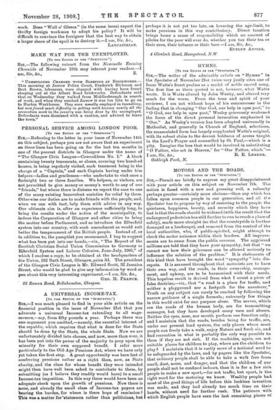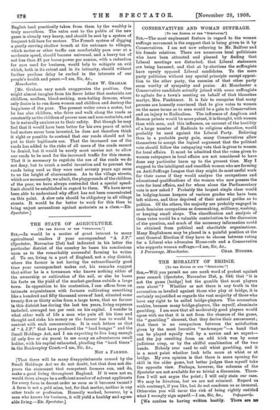MOTORS AND THE ROADS.
[TO THE EDITOR Or THE "SPECTATOR.-] Sin,—Permit me briefly to express my great disappointment with your article on this subject on November 7th. The nation is faced with a new and pressing evil, a calamity perhaps greater—certainly more obvious—than any which has fallen upon common people in our generation, and all tl.e Spectator has to propose by way of restoring to the people the quietness, happiness, beauty, and security which they have lost is that the roads should be widened (with the result that the endangered pedestrian bas still further to run to reach a place of safety), made more straight (so that the countryside is further damaged as a landscape), and removed from the control of the local authorities, who, if public-spirited, might attempt to check the motor nuisance within their borders. All improve- ments are to come from the public revenue. The aggrieved millions are told that they have your sympathy, but that " we cannot see how their grievance can be allowed seriomily to. influence the solution of the problem." It is statements of this kind that have brought the word " sympathy " into dis- repute. It is assumed throughout that motorists are to have their own way, and the roads, in their ownership, manage- ment, and upkeep, are to be harmonised with their needs. This hopeless result is derived from what I count a piece of false doctrine,—viz., that "a road is a place for traffic; and neither a playground nor a footpath for the saunterer," Truth on any subject can rarely be reached by following the narrow guidance of a single formula; extremely few things in this world exist for one purpose alone. The nerves, whirls are the roads of the human body, are for transmitting- messages, but they have developed many uses and abuses. Neither the eyes, nose, nor mouth perform ono function only; and I maintain that the roads, besides being for traffic, are, under our present land system, the only places where most people can freely take a walk, enjoy Nature and fresh air, and find recreation in what is probably the only way possible to them if they are not rich. If the roadsides, again, are not suitable places for children to play, where are the children to play ? I maintain that it is vastly more of a national need to be safeguarded by the laws, and by papers like the Spectator, that ordinary people shall be able to take a walk free from smell, dust, noise, and danger, and that the children of our people shall not be confined indoors, than it is for a few rich people to make a new sport,—for not traffic, but sport, is the right word for the motoring we know. Wealthy people had most of the good things of life before this luckless invention was made, and, they had already too much time on their hands, without need for further rush. The patience, with which English people have seen the last remaining pieces of
English land practically taken from them by the wealthy is truly marvellous. The extra cost to the public of the new game is already very heavy, and should be met by a system of frequent toll-bare for motors. The French system of digging a gently curving shallow trench at the entrance to villages, which motor or other traffic can comfortably pass over at a moderate speed, should become universal, and a heavy tax of not less than £1 per horse-power per annum, with a reduction for cars used for business, would help to mitigate an evil which, both in its extent and in its intensity, should without further perilous delay be curbed in the interests of our people's health and peace.—I am, Sir, &c., [Mr. Graham very much exaggerates the position. One might almost imagine from his fierce letter that motorists are childless, soulless, blood-seeking, man-hating demons, whose only desire is to run down women and children and destroy the happiness of the poor. The present writer owns a motor, but he has also children, who drive and walk along the roads as constantly as the children of poorer men and non-motorists, and he is naturally anxious as to their safety. But though he may feel that it would have been better for his own peace of mind had motors never been invented, he does not therefore think it right or possible to contend that our roads should not be put to their legitimate use. That the increased use of the roads has added to the risks of all users of the roads cannot be denied, but it would be surely most unwise not to allow our roads to be used for the increased traffic for this reason. That it is necessary to regulate the use of the roads we do not deny, but to crush a useful invention and to prevent the roads being used as they were used seventy years ago seem to us the height of obscurantism. As to the village streets, which are necessarily, we admit, the playgrounds of the children of the poor, we have always contended that a special speed- limit should be established in regard to them. We have never been able to understand why effort has not been concentrated on this point. A slow rate should be obligatory in all village streets. It would be far better to work for this than to bring unjust accusations against motorists as a class.—ED. Spectator.]



















































 Previous page
Previous page